How crumbling buildings, improper practices caused a Dover nonprofit to lose federal money
A Delaware nonprofit that provides emergency shelter and services to the homeless is in jeopardy of losing public funding amid a myriad of problems including deteriorating buildings, understaffing and asking clients to perform jobs without pay.
The Delaware State Housing Authority, Delaware Department of Health and Social Services and Dover city code records along with nonprofit board emails and records reviewed by Delaware Online/The News Journal reveal a pattern of problems over the past few years at the Dover faith-based nonprofit Interfaith Mission for Housing.
Dover Interfaith is one of few organizations in Kent County that provides emergency shelter to homeless men, some of whom are sex offenders. The nonprofit houses about 40 men in its emergency shelter and transitional housing locations. It also offers case management services to housing insecure men, women and children through its day resource center.
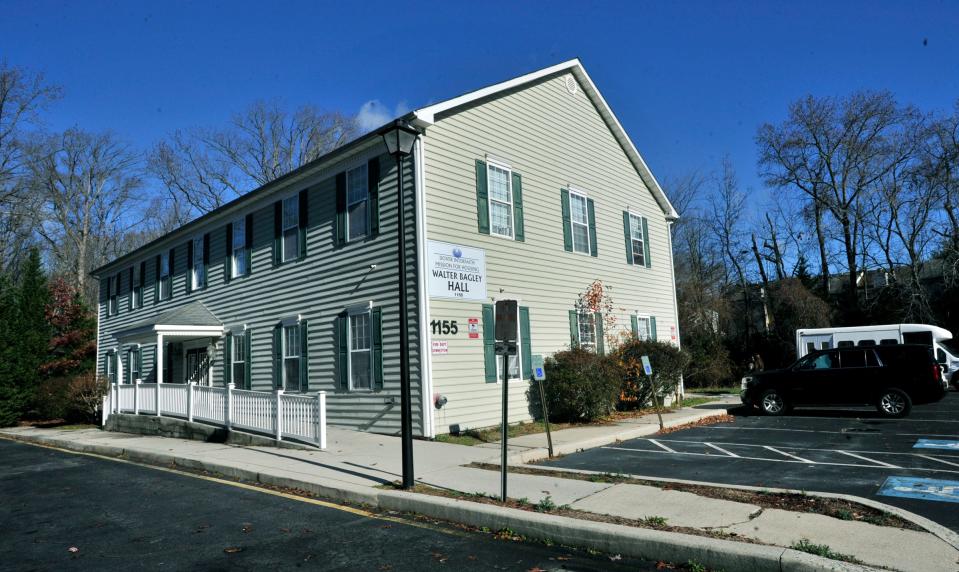
Since Interfaith was formed in 2008, the organization boasts on its website that it has helped over 3,000 homeless men. It has been contracted with the state to provide emergency transitional housing since 2011 and, in the last few years, was infused with over $5 million in American Rescue Plan Act (ARPA) funding from the state on top of its state, federal and local government grants.
While the nonprofit’s revenue growth has encouraged Interfaith to expand with the purchase of additional property for transitional or affordable housing, the organization lost an $18,000 federal grant last year because state officials determined Interfaith wasn’t following federal laws and policies for receiving the funding.
Interviews with former employees and board members, emails and board minutes shared with Delaware Online by those formerly affiliated with Interfaith, state audits and reviews, and Dover city code records reveal an organization struggling to maintain the properties it owns; finger-pointing among board members and staff; and disorganized internal practices that create an ethical quagmire.
Former and current board members along with former employees agreed to speak with Delaware Online on the condition of anonymity due to fear of retaliation by Interfaith’s board leadership.
Our investigation found that the nonprofit:
Charged a $50 “bike storage fee” on some homeless residents when staying at the shelter.
Asked residents to do odd jobs for the nonprofit for no pay, seemingly out of the scope of the housing program.
Lacked adequate staffing to maintain Interfaith’s programs and services.
Failed to maintain its residential properties.
Failed to provide copies of grievance and appeals policies for its residents along with a conflict of interest policy for the organization, employees and board leadership to the Delaware State Housing Authority.
Lacked adequate records on residents’ eligibility to the homeless shelter, case management services and entry and exit documentation; and in some instances, no records were found for clients.
National nonprofit organization experts and advocates for the homeless say it’s critical nonprofits have written policies and procedures that are followed to ensure the people they serve are treated with respect and services are doled out in a transparent and fair manner.
HOMELESS HOUSING: The Delawareans who call motels home during the holidays
“Nonprofits operate on the public’s trust, and that trust is sacred. When it is damaged or violated, it makes it so much more difficult for the organization to do its work and there are people’s lives depending on that work,” said Rick Cohen, chief communications officer and COO of the National Council of Nonprofits. “It’s just vital that everything gets fixed because the people who come to this organization deserve respect.”
Interfaith board chair Jeanine Kleimo denied allegations of dysfunctional internal operations and questionable ethical practices and blamed the nonprofit’s non-compliance in state audits on former staff that she said have since been fired.
The nonprofit “has a grievance policy, eviction policy, and a conflict of interest policy,” Kleimo said in an emailed response to Delaware Online questions. “Staff who failed to address the issues related to record maintenance were terminated accordingly. Records are now in compliance.”
Kleimo did not provide copies of these policies when asked.
Interfaith loses federal housing grant
Dover Interfaith did not provide these policy documents to Delaware’s housing authority either, which was among the reasons the nonprofit was found non-compliant in a recent audit and lost an $18,000 U.S. Housing and Urban Development Emergency Solutions Grant last year.
In an April 20, 2023 letter, the housing authority informed Kleimo that Interfaith had lost the federal grant, and its non-compliance had put other public funds in limbo.
This letter was initially provided to Delaware Online by former Executive Director Karen Rowland and later received from the Delaware State Housing Authority through a Freedom of Information Act request.
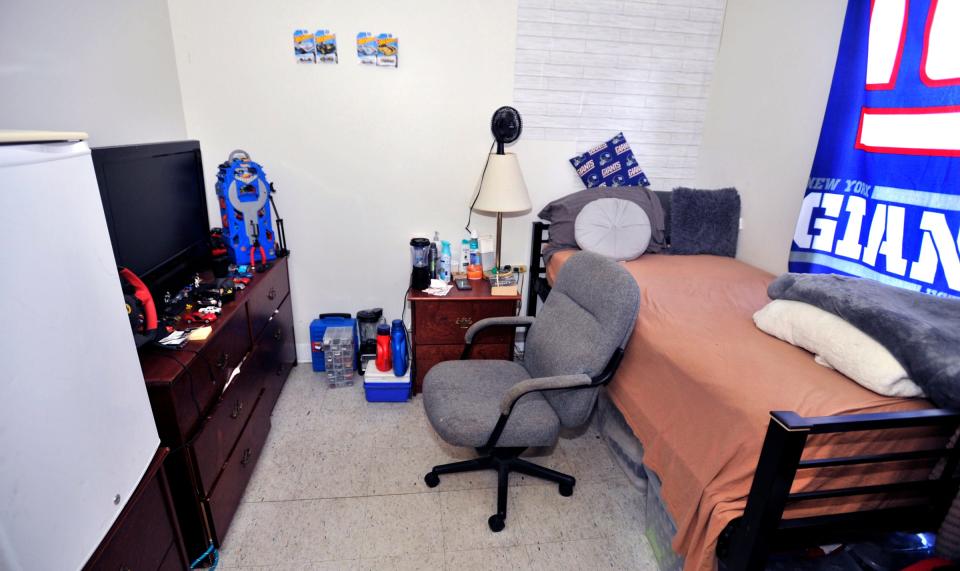
When the nonprofit began operations, it relied primarily on private donations and contributions to operate, receiving less than $100,000 in federal, state or local government funding annually through 2014, according to the nonprofit’s 990 tax forms. The organization has continued to grow its revenues since, surpassing $500,000 in combined government grants and private donations in 2018 and hitting $2.8 million in 2022, according to the 990 forms.
The state Housing Authority began evaluating the nonprofit’s emergency shelter program in October 2022 and concluded its examination in March last year, finding that Interfaith:
“Failed to maintain adequate records” on clients’ eligibility to the program.
“Failed to maintain adequate case records” on clients’ assessment and service needs.
Didn’t follow written policies or procedures for admission and discharge.
Lacked written policies and procedures for “shelter termination or a written formal process recognizing the rights of the individuals affected."
Lacked conflict of interest policies, both organizational and individual.
Rowland said she tried to furnish the records requested by the housing authority in the recent audits, but struggled to find the documents because Interfaith’s record-keeping is disorganized.
Rowland said she began receiving pushback for speaking out about the condition of Interfaith’s housing, lack of adequate client records and case management services, and failure to follow proper protocols and policies in 2023.
“Where is the continuum of care piece?” she said of Interfaith’s lack of assessment and plans for clients’ needs.
Rowland began as an intern with Interfaith in 2018 and quickly moved into a full-time case management role. She was promoted to executive director in June 2021.
Upon deeper examination, the housing authority also found that Interfaith was charging some residents a $50 “bike storage fee.”
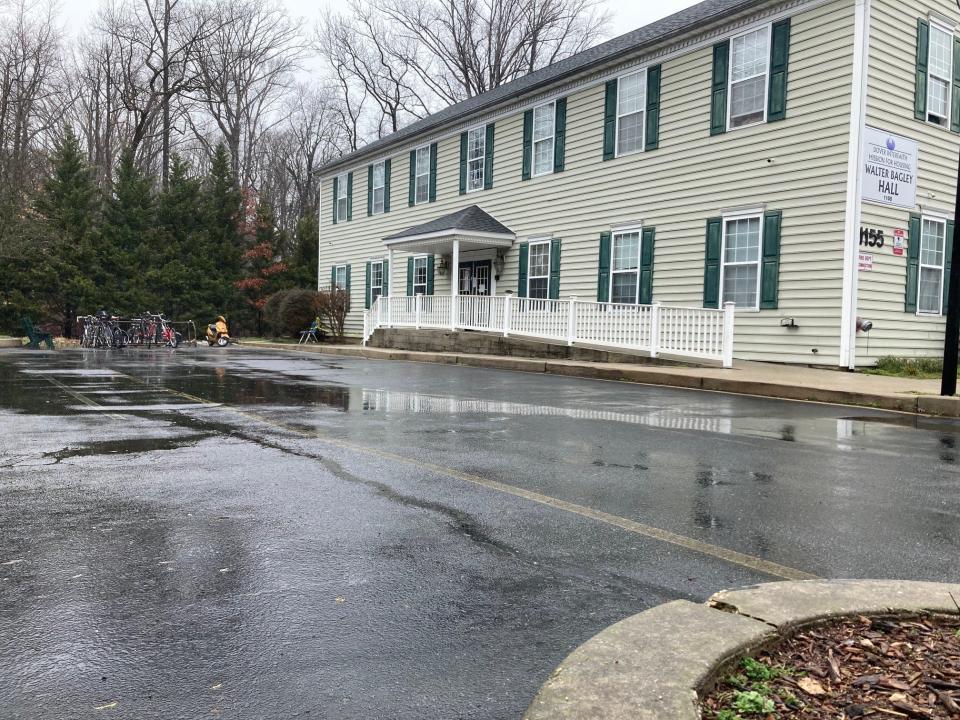
Kleimo says the nonprofit never assessed this charge. She said Interfaith operated a “bike shop” for several years that sought donations of bikes and bike parts from the community, and made space available to fix up the bikes.
“This is a misperception,” she said. “What was in place was a $50 charge to purchase a bicycle from the bike shop once someone was ready to leave the shelter and wanted to continue to have a bicycle for his personal use.”
Housing authority officials said they discovered the “bike storage contracts signed by shelter clients” during their audit in 2023, which only audits a sample of the nonprofit’s client files.
“Our findings are not evidence that all shelter residents were asked to pay the $50 fee or sign the bike storage contract,” authority spokesperson Laurie Stovall said. The housing authority declined to provide a copy of the contract for Delaware Online’s review.
‘Bartering for shelter’
Former board members and employees allege executive leadership also regularly used residents to do odd jobs for the nonprofit and its board leadership that appeared to be outside the scope of any housing programs residents were part of.
This “bartering for shelter” practice has reportedly taken place for years at Interfaith, according to former employees and past and present board members, but Interfaith’s board chair denied the claims.
Interfaith board members have encouraged community supporters to hire shelter residents, Kleimo said, but no one is “required to work for free.
“There have been times when volunteers have been requested among shelter residents to assist with tasks such as moving furniture,” Kleimo said. “However, this has never been a requirement.”
Yet, the nonprofit board’s Personnel Committee received four separate testimonies from residents who were asked to move boxes and furniture from 1156 Walker Road for “coffee and donuts,” apparently under the impression that it wasn’t optional. Interfaith recently purchased the vacant property across from its emergency shelter on Walker Road for future transitional housing.
“I was told on Saturday that I had to work for coffee and donuts to unload a building when I could of been working for money,” one resident wrote after the Sept. 30, 2023, incident. “While I’m grateful for the 30-day stay, I feel like I was violated and forced to work for free. Please understand my position. I’m grateful, but I deserve to be paid for my labor.”
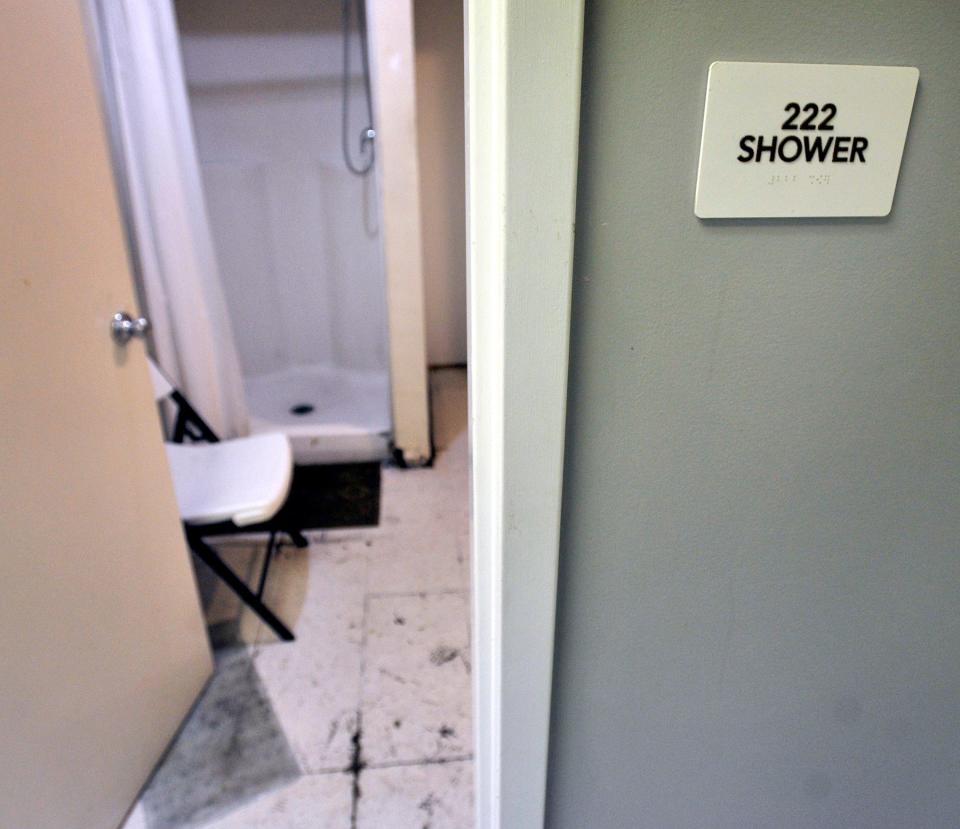
While many shelter and transitional housing programs have requirements and tasks residents must complete, like keeping their rooms clean and other household chores, it’s unclear what requirements Dover Interfaith had for its program participants.
Delaware Online’s questions regarding allegations that Interfaith barters with residents for shelter prompted the Delaware Department of Health and Social Services to investigate further.
The department audits the contract every two years to ensure compliance, spokesman Timothy Mastro said, and state officials will audit Interfaith again this year.
“Under this contract with (Dover Interfaith Mission for Housing), DHSS did not receive any specific allegations, like the ones made in this inquiry,” he said in an emailed response. “DHSS treats inquiries such as this one as allegations and will investigate accordingly. DHSS cannot comment on the legality of these allegations at this time.”
Another resident also testified to the expectation of having to move boxes for no pay.
“I felt very disrespected and disappointed with my time when normally I make money doing side jobs,” the resident wrote. “I already had something else planned but I was told that I would have to wait and help get this done for donuts.”
A former Dover Interfaith social worker reached out to the nonprofit’s leadership in October indicating that Interfaith’s clients had written to them about having to work for free for the organization. The social worker said they were “bothered” by this news as those in the field are guided by a code of ethics that Interfaith staff members should also follow.
DEVELOPMENT: Which county leads Delaware in housing growth, more than the other counties combined?
Board members also said residents were asked to do work without pay, or little pay, at executive leaderships’ homes, which had never come to the attention of the full Board of Directors prior to efforts some members made last summer to interview residents about the problems.
No experts or attorneys could comment on the legality of bartering for shelter, but the housing authority said, “It is not a permissible practice upon acceptance of federal funds.”
The Delaware Department of Labor said the practice “raises eyebrows,” and encouraged anyone who may be experiencing this to contact the department’s Division of Industrial Affairs so officials can examine the allegation. People can report issues by calling 302-761-8200 and selecting option 3.
Donald Whitehead Jr., executive director of the National Coalition for the Homeless, said bartering with unhoused individuals by nonprofits big and small is “fairly common.”
He said it’s common among faith-based groups, particularly when those nonprofits do not receive federal aid that brings a level of oversight and accountability. And when these nonprofits do receive federal funding, Whitehead said leaders often disagree with the federal guidelines they’re supposed to follow.
“You keep them in homelessness if you don't allow them to go out and pursue their own economic opportunities. It’s disgraceful,” Whitehead said.
Lacking written policies, proper client documentation
State reports have impressed upon Interfaith for years the need for adequate client case management notes and documentation as well as the necessity for written policies that ensure the rights of their clients and protect against individual and organizational conflicts of interest.
Interfaith staff and board members as well as state reports show there have been several occasions when some residents were given extensions to stay at the shelter while others were evicted without adequate notice or reason.
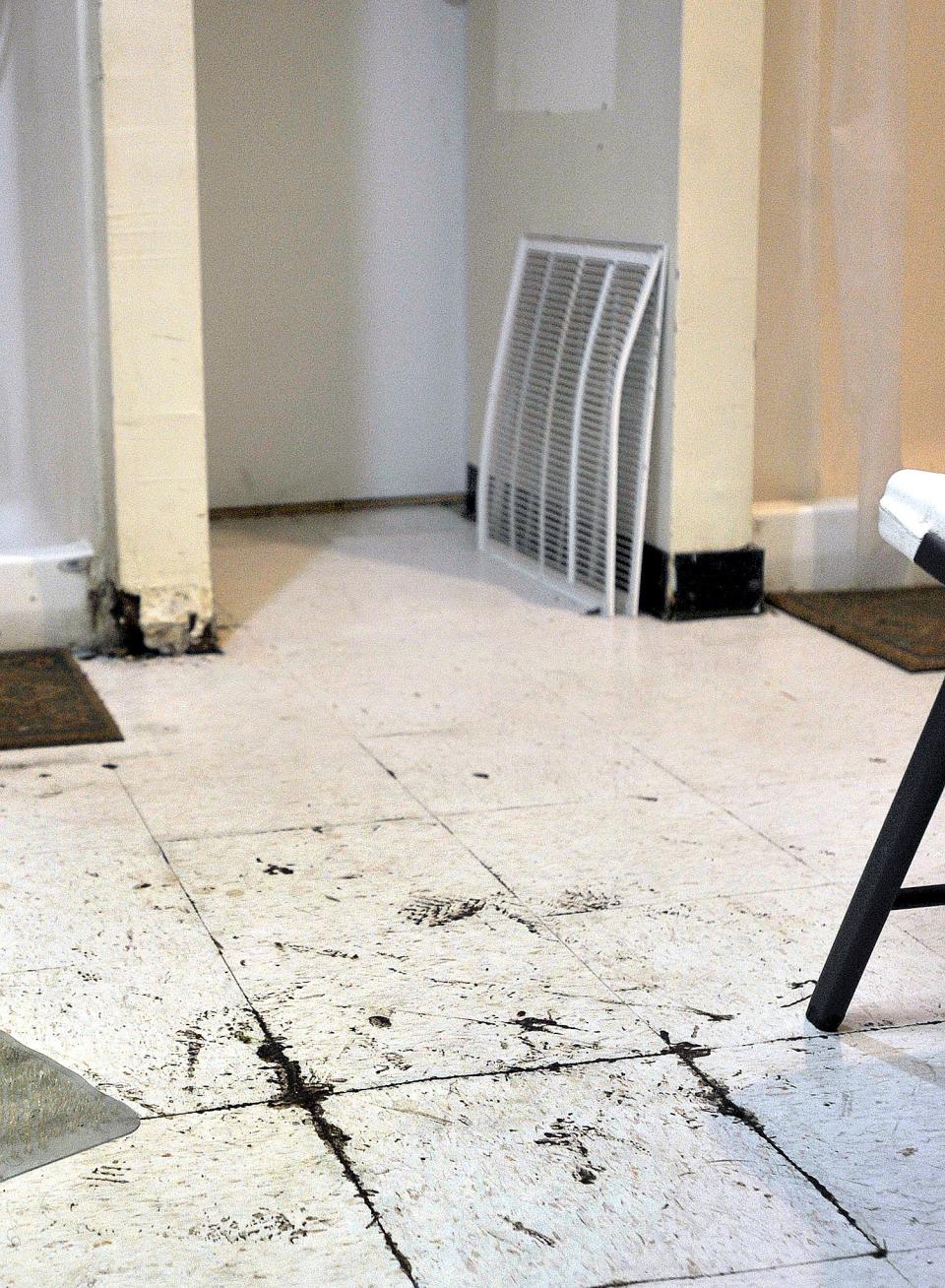
Housing authority monitoring reports dating back to 2013 show the nonprofit’s struggle to establish consistent internal operations for case management and client services, the lack of a long-term strategic plan, and the need for adequate staffing and a chain of command.
Interfaith's Personnel Committee last year was asked to “report on the rent collection process,” the former chair of the committee said.
“This is when we discovered that there is no process in place for the rent money that is collected from the tenants at Interfaith Crossing. No records are kept, and no reporting is done,” the former committee chair said in an email to executive leadership on Sept. 29, 2023. “How would we defend against a tenant who is accused of not paying rent?”
The board member, in the same email, also expressed concern about grant money and the lack of transparent recordkeeping on Interfaith’s finances. Concerns over services for the nonprofit’s board leaders being billed to Dover Interfaith were also raised.
Those who spoke on the condition of anonymity with Delaware Online provided copies of email exchanges among Interfaith's board members.
Other board members said if there ever were any written policies, manuals or guidelines established by Interfaith, they never saw them.
Kleimo said Interfaith has grievance, eviction and conflict of interest policies, and staff who failed to maintain these records were fired, but she did not provide copies of those records when asked.
She also did not respond to follow-up calls or emails for clarification.
Board members, staff clash
Board members told Delaware Online that they were never made aware of written policies or incident reports, if there were any, which became a pattern by Interfaith’s executive leadership.
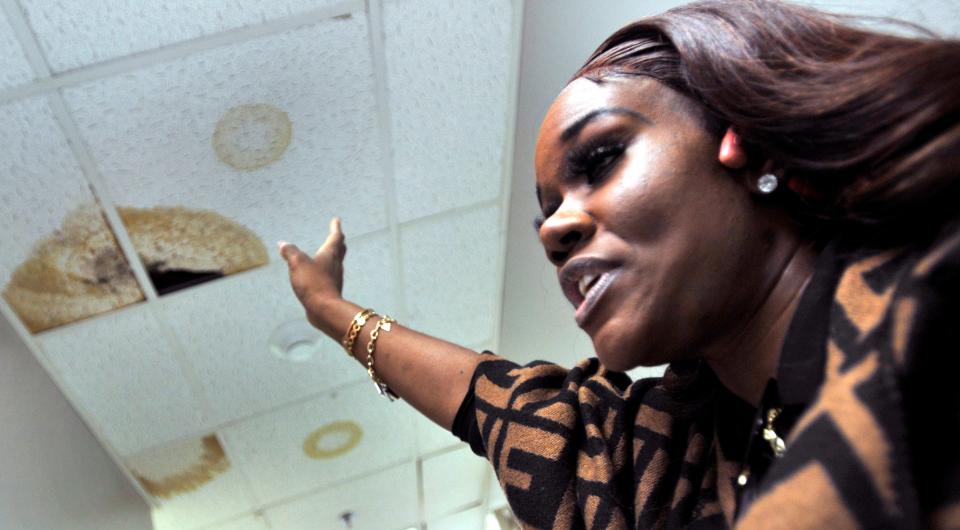
They said leadership created an internal culture where other board members were kept in the dark about the nonprofit’s operations and issues.
Those leading the organization expected board members to follow their lead, and when they didn’t, board members’ concerns were ignored or dismissed, the board members said. It’s why many board members didn’t ask questions, they said.
The fissure between Interfaith’s executive leadership and board members deepened last year as members of the board’s Personnel Committee began digging into the myriad issues challenging the nonprofit and made recommendations.
Among those challenges was in hiring and fully staffing the nonprofit. Board members pressed upon executive leaders that staffing was “chaotic” and, before pursuing large projects and new programs, internal issues should be addressed first.
“When organizations grow, there is typically a strategic plan that includes timelines of the process and addresses staffing. Many organizations are not successful because they grow and grow in chaos without a plan,” one individual brought on to consult on personnel matters advised in a May 22, 2023 email shared with Delaware Online. “My general belief is that company growth should be done cautiously and sequentially with an active ‘punch list’ along the way.”
The need for a strategic plan has been underscored by state authorities to Interfaith leaders for over a decade, including in the state’s first monitoring review of the nonprofit’s emergency shelter in 2013 and subsequent state reviews through 2023 that noted the need for adequate staffing and written policies and guidelines for operation.
It wasn’t until September 2023 that Interfaith began crafting a strategic plan, but even those plans ran counter to recommendations board members gave.
The Personnel Committee had expressed concern about staffing and a lack of clarity on the chain of command, which the group said in its August 2023 meeting minutes was hindering then-Executive Director Rowland’s ability to establish authority.

The nonprofit board's Personnel Committee said in its recommendations for strategic planning that Rowland was never given adequate training when she took on the role of executive director in June 2021.
Ahead of a September strategic planning meeting, the Personnel Committee had issued a statement outlining their recommendations on staffing and personnel and alluded to the pushback Rowland had experienced by some of the executive leadership.
“She has been treated very unfairly by the board’s leadership. She has received no mentorship or training for two years, since she started as an intern,” committee members wrote in early September. “Furthermore, the board members have been negatively influenced by the board’s leadership. We should never allow ourselves to form an opinion of someone’s qualities merely on the negative opinion of another person.”
Despite the committee members' concerns and recommendations, the following month executive leadership put forth a strategic plan that removed Rowland from the position and placed every staff member on “interim” status.
Current board members said they had no problem with Rowland, but noticed the growing tension between the executive director and Kleimo.
Then, on Dec. 19, Rowland was fired from her position.
Kleimo did not respond to follow-up questions regarding Rowland’s termination nor who currently fills the role, but denied claims that board members’ recommendations aren’t considered.
“The officers and Board of Directors of (Dover Interfaith Mission for Housing) are committed to the improvement of the organization and open to any ideas that contribute to the overall health of the organization,” she said.
Deteriorated buildings house homeless
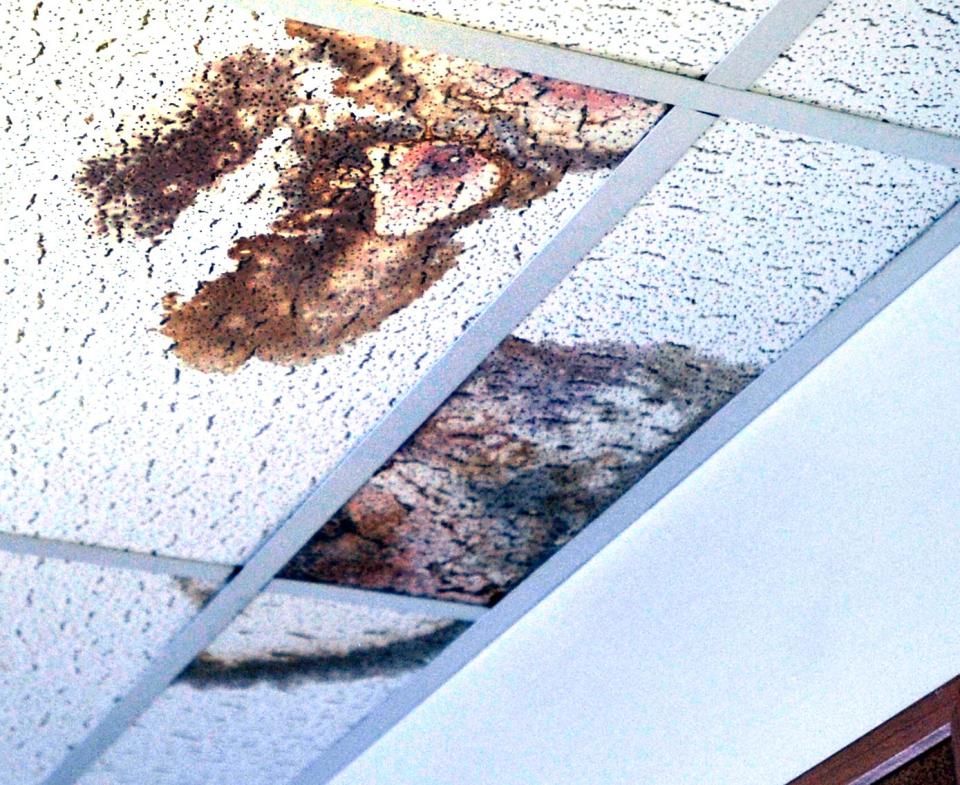
While Interfaith has taken on additional property in recent years, including a former daycare center across the street from the emergency shelter and a large property on West Division Street, the nonprofit’s existing properties have deteriorated.
Interfaith’s former executive director gave a tour of Walt Bagley, the emergency shelter on Walker Road in Dover, to Delaware Online staff in December, showing the damage caused by a roof leak.
Walls and floors on the first floor were covered in black mold, and a leak damaged electrical wiring in the downstairs bathroom and weakened the hallway flooring. The leak had also damaged electronics and caused a small fire in one resident’s room, Rowland said
But that was only the latest problem the shelter was facing, Rowland said at the time.
The building recently replaced a broken hot water heater, and continues to struggle with adequate heat in residents’ rooms. Some rooms during the shelter visit Dec. 11 were noticeably colder than others. To address the lack of heat, residents are given small space heaters, Rowland said.
Although state health department reports on the physical conditions of the shelter were never problematic, city of Dover code inspectors found multiple violations in 2018, including damaged ceiling tiles, damaged window screens, several non-latching doors and overgrowth blocking the fire department connection.
Inspectors also indicated in a July 2018 inspection that the building required electrical and hood suppression inspections. Hood suppression systems are installed in commercial kitchens to prevent fires.
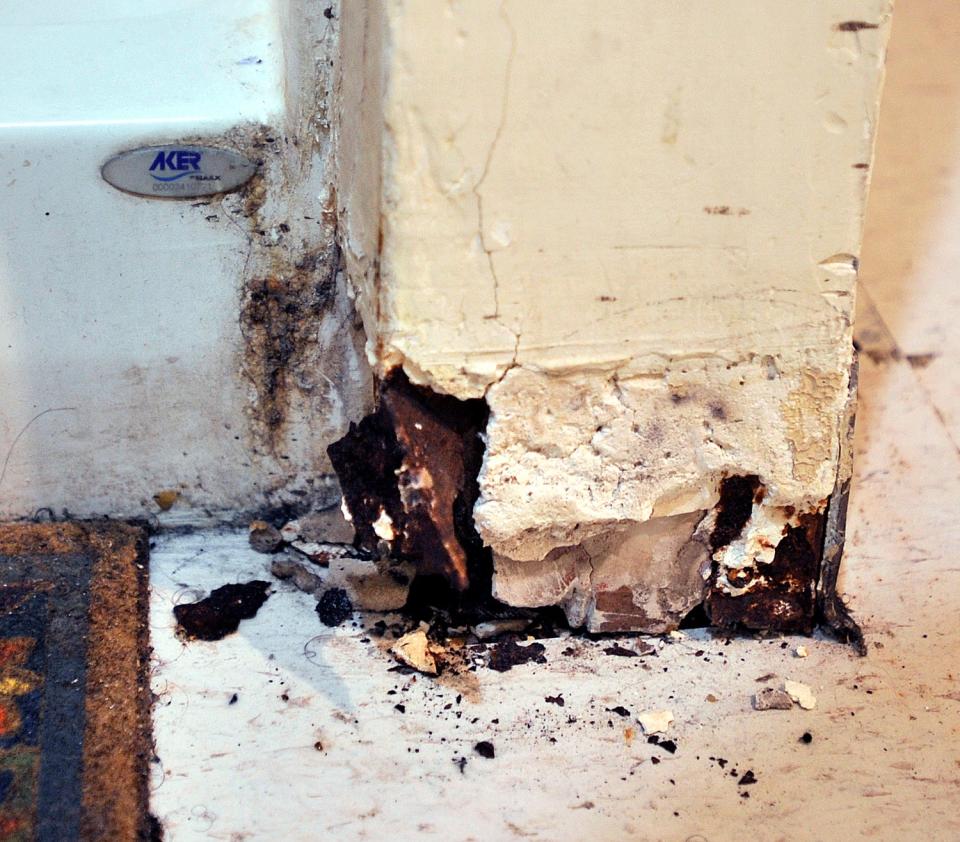
Dover inspectors visited the shelter again in 2021 for a bed bug infestation that Interfaith was later fined for not addressing.
Interfaith’s board chair blamed staff for the delayed repairs.
“Staff was charged with soliciting bids for repairs at Walt Bagley Hall. They failed to do so,” Kleimo said. “The board has since engaged local contractors and had all of this work performed.”
State and city inspectors have also found health and safety hazards at Interfaith’s Ross Street property, and nonprofit board members and social workers who have worked with the nonprofit say Interfaith Crossing – a men's only transitional housing complex in Felton – also has problems.
Former board members and social workers say the property on South Dupont Highway in Felton is in need of major repairs and has had issues with mold and bedbugs, among other problems.
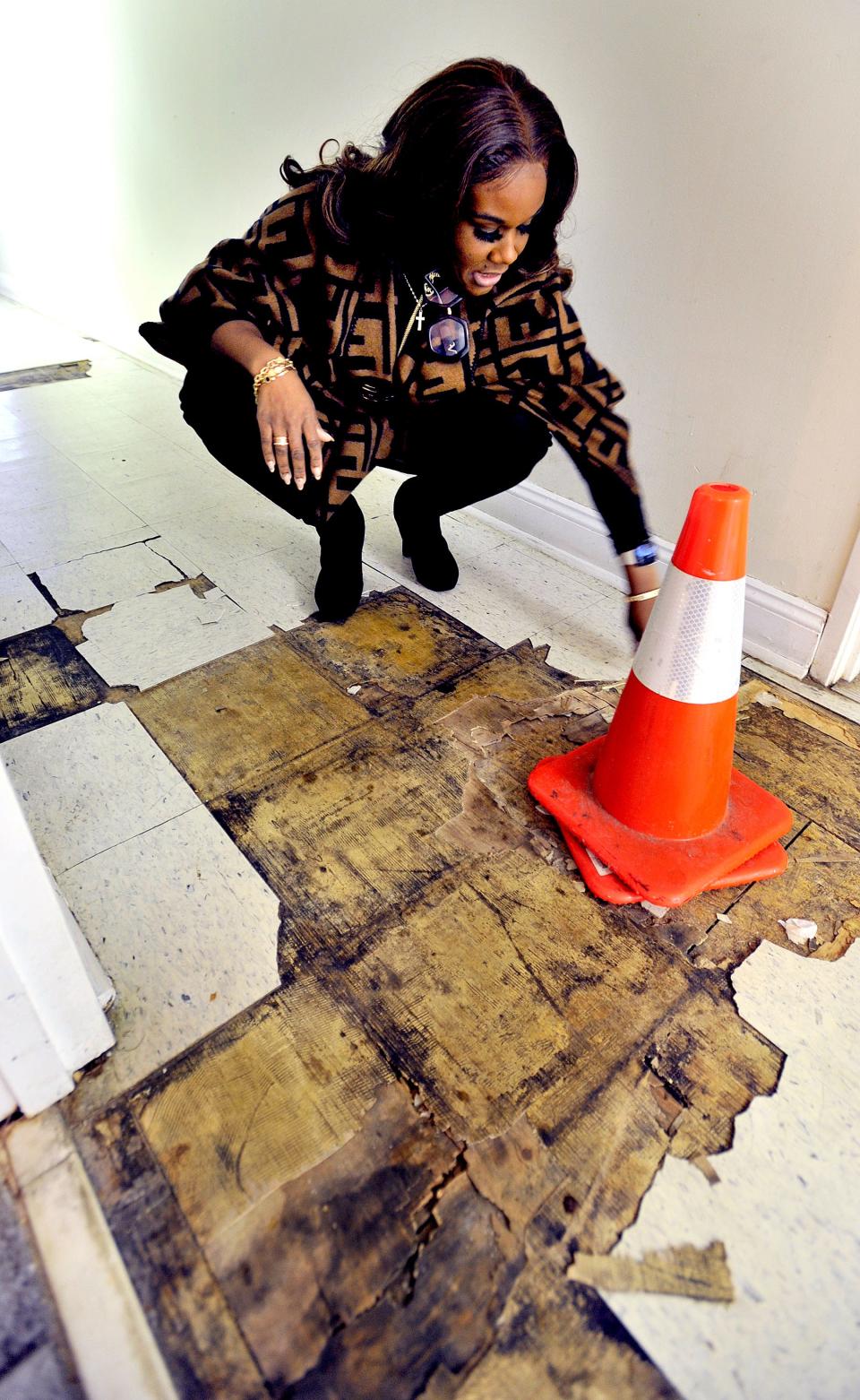
And at 523 Ross St., the Delaware State Housing Authority's physical inspection in April 2023 found Interfaith had failed to correct three “imminent health and safety issues,” which included broken carbon monoxide detectors, malfunctioning smoke detectors and expired fire extinguishers.
The inspection also noted that Interfaith needed to repair the front porch columns, replace the screen door, properly install soffits and gutters, secure loose siding, repair holes in the exterior that are allowing squirrels to enter and repair drywall.
Kleimo again blamed staff for the nonprofit’s failure to address the organization’s crumbling buildings.
“Former staff failed to address necessary repairs at Ross Street,” she said. “The Board has completed or is in the process of completing the identified repairs.”
The reports listed Kleimo as the main contact for state authorities.
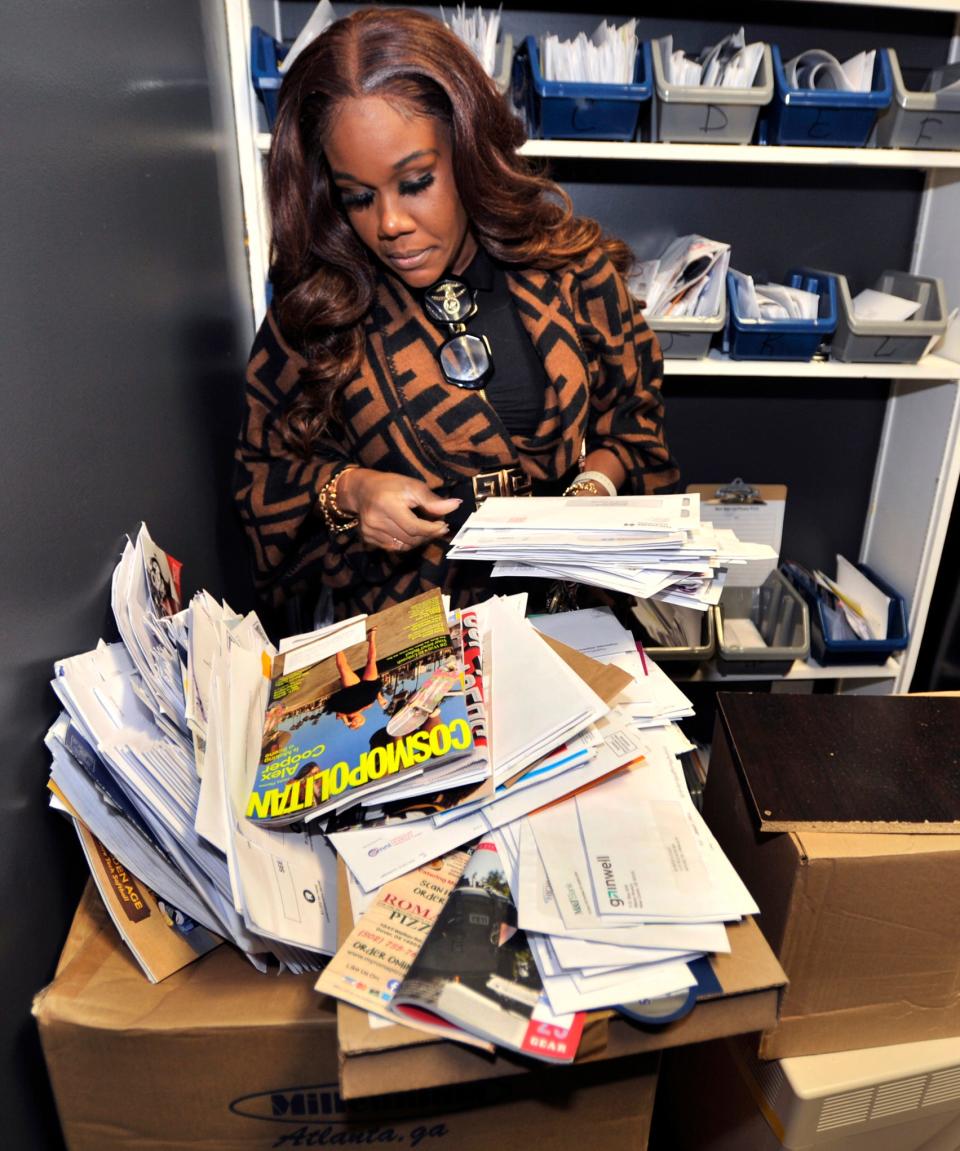
Compounding problems, Interfaith also faces issues with the properties it most recently acquired, Rowland and former board members said.
The resource center, which has had sporadic operations since Interfaith lost its last location and purchased property on West Division Street, serves as a place for housing insecure Delawareans to receive mail, access meals and hot showers, and connect with other resources.
RELATED: Dover Interfaith homeless shelter is running out time to find new location
But even this location has problems, Rowland said in December. Heating and cooling didn’t work properly throughout 2023, so the building was often closed. Interfaith also struggled to adequately staff the location, she said.
A need for 'reimagining' shelter
Despite the documented issues, Interfaith has received nearly all of its $5 million American Rescue Plan Act funds awarded to the nonprofit by the state in 2022.
Since then, a total of $4.94 million has been dispersed to Interfaith from Gov. John Carney’s office, which awarded the ARPA funding, according to the online Delaware checkbook.
A governor’s spokesperson said ARPA funding was monitored for compliance within the program, and no issues were found.
“There have been no compliance issues found to this point on the awarded ARPA projects and the state has had no reason to halt their funding, but will continue to monitor them closely given issues recently raised,” said Carney’s spokesperson Emily Hershman. “This organization provides critical services for the population in the Dover area, and we hope they will be able to bring the projects to fruition.”
And while Interfaith did lose an $18,000 federal grant through the state housing authority, the nonprofit has not lost additional funding, even though authority spokesperson Stovall said the state still hasn’t received “any corrections regarding the Ross Street health and safety physical inspection conducted” in April last year.
Whitehead said the systemic problems Interfaith is experiencing is one of the reasons why there should be minimum standards for shelters throughout the country, regardless of where the organizations get their funding.
“We know that shelters don’t have enough money for the most part to pay staff, staff gets paid lower wages, but when it comes to cutting corners, it shouldn’t be on the back of people with lived experiences,” he said. “It sounds like there is a lack of compassion — if you are asking people to pay to stay, if you are asking people to reside in facilities not up to standard, it sounds like this community needs to reimagine what shelter looks like.”
Got a tip? Contact Amanda Fries at afries@delawareonline.com, or by calling or texting 302-598-5507. Follow her on X at @mandy_fries.
This article originally appeared on Delaware News Journal: Why Dover Interfaith Mission lost a federal grant for its shelter

